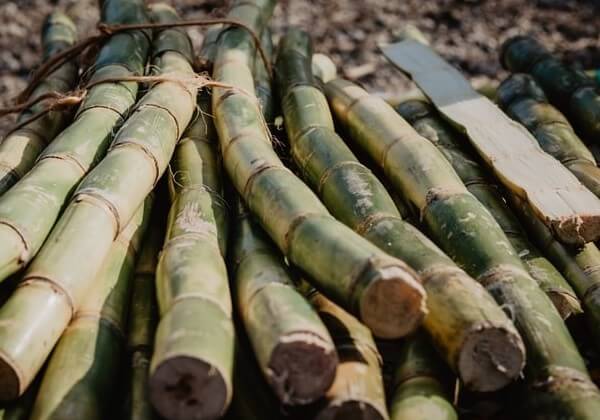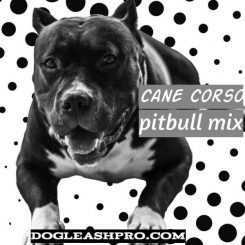
During the fall season, you’ll find an abundant amount of Sugar Cane at your local grocery store or supermarket. Many people around the world enjoy chewing on this sugary plant, but is it safe for dogs? Keep reading to find out if Sugar Cane is good or bad for dogs.
Can dogs eat Sugar Cane? No, dogs should not eat Sugar Cane because it contains tons of sugar that your dogs do not need. Consuming a tiny amount of Sugar Cane juice should be fine, but excess consumption of it can cause a host of health issues in dogs. If you’d still like to feed your pooch a little bit of Sugar Cane juice, proper preparation is key.
Table of Contents
Can dogs have Sugar Cane?

No, dogs should not have Sugar Cane. Our canine friends don’t really need sugar in their daily diet. That’s because our pups usually get their sugar intake from complex carbohydrates in their regular dog food.
To fully understand why dogs should not have Sugar Cane, let’s take a closer look at what Sugar Cane is.
What is Sugar Cane?
Sugar Cane plants look like bamboo sticks on the outside, but inside, it’s full of that sugary juice. In many countries around the world, people enjoy chewing on the Sugar Cane while chatting with friends or watching tv.
Sugar Cane comes in green or reddish-purple color. Sugar Cane has a thin outer layer. Before you can bite into it, you must peel off this outer layer first. Inside, you’ll find this fibrous flesh which is called bagasse. Chewing on the bagasse releases a ton of sweet Sugar Cane juice. The sweet juice tastes exactly like plain sugar with a mild plant tang.
Many enjoy this pure sweet taste because of the amazing health benefits it possesses. The sweet Sugar Cane juice contains a high concentration of the following:
- Magnesium.
- Manganese.
- Iron.
- Calcium.
- Potassium.
This makes the Sugar Cane juice alkaline in nature. Alkaline is known to have a higher pH level and can neutralize the acid in the body. All of this is known to help with the following:
- Improve and boost liver function.
- Aid the digestive system.
- Fight against cancer cells.
As you can see, Sugar Cane juice may be a healthy drink and food for humans, but it is still debatable whether our canine friends would receive the same health benefits from it.
After chewing on the sweet fibrous flesh and consuming that sweet juice from the Sugar Cane, you’re left with this dry pulpy residue that can not be ingested. The pulpy dry residue should be thrown away and in many countries, it is actually used as fuel for electricity generators.
While the Sugar Cane stalk can be peeled and chewed for a nice cool sweet treat, it can also be pressed by a machine to extract that refreshing sweet juice. The machine extracts that juice and stores the pulpy residue on the side.
Many manufacturers will process the sweet Sugar Cane juice into refined or raw sugar.
So, while the Sugar Canes may look cool and harmless, it’s actually pretty harmful to our furry friends. Let’s discuss this more in-depth next.
You may be interested in Can Dogs Eat Pop Tarts?
Is Sugar Cane bad for dogs?

Yes, Sugar Cane is bad for dogs. Let’s discuss the amount of sugar in Sugar Cane first.
Too much Sugar consumption is harmful to dogs
As the name suggests, Sugar Cane is full of sugar and our K9 pals do not need to consume sugar at all – not even a tiny bit. Sugar does not provide any health benefits to our canine pooch.
In fact, if our four-legged friends consume even moderate to large amounts of sugar, they are at risk of a host of serious health issues such as:
- Diabetes.
- Metabolic changes.
- Dental issues like tooth decay, cavities, and enamel loss.
- Canine obesity.
- Pancreatitis (in severe cases).
While the amount of sugar in Sugar Cane is less than sugary candies like Sour Patch Kids, it is still considered a lot of sugar for dogs. In just 3.5 ounces or 100 grams of Sugar Cane juice, there are about 13 grams of sugar and almost 58 calories.
Since sugar is unnecessary to your dog’s diet, if your pooch consumes about 13 grams of sugar, that is an excess of 13 grams of sugar your pup did not need.
While it’s fine to consume a tiny amount of Sugar Cane as a rare occasional treat, try not to feed your pooch Sugar Cane juice regularly or frequently.
If your furry friends consume too much sugar over a long period of time, they may be at risk of weight gain. This can cause your pooch to develop serious health issues like diabetes, metabolic changes, and canine obesity. Dog owners should not push it because continuously eating sugar can cause dogs to develop Type II diabetes.
Once your pooch develops Type II diabetes, her pancreas will not be able to produce insulin. What results is your four-legged friend not being able to process sugar. This is a serious health concern because this means even eating normal dog food can be troublesome since the dog’s body will need to break down complex carbs into sugar, but her body is not able to process it.
This can lead to both short-term and long-term problems. In the short term, your pooch may experience the following symptoms:
- Upset stomach.
- Diarrhea.
- Vomiting.
Not only will these symptoms cause discomfort for dogs, but they can be a hassle for dog owners as well. The vomiting and diarrhea will be a result of an imbalance of microorganisms in the dog’s gut and unfortunately, dog owners will have to clean up the mess.
Handy Hint: A dog’s vomit can tell you a lot about why your dog isn’t feeling well. We’ve shared a Dog Vomit Color Guide to help you determine why your dog is vomiting.
Over the long term, your canine friends will have to live with the following symptoms:
- Dental issues such as cavities, tooth decay, and enamel loss. Keep in mind that the bacteria in your dog’s mouth use the sugar to produce acid which will ultimately lead to loss of minerals in the enamel or coating of your dog’s teeth. When the outer coating of your dog’s teeth diminishes, it can cause tooth decay and loss. What results is dental disease in dogs.
Did you know that over 80% of dogs have dental disease by the time they reach 3 years of age? Let’s not add to this statistic by feeding our pooch Sugar Cane.
For the reasons here, we do not recommend that you feed Sugar Cane juice to your canine friends.
Exterior layer of the Sugar Cane can cause internal injury to dogs
The Sugar Cane comes in two parts. The outer layer and the inner layer. If you plan on feeding your dog Sugar Cane anyways, be sure to peel off the brittle exterior layer first. If your pooch accidentally chews the Sugar Cane without any proper preparation from the dog owner first, they may be at risk of internal mouth injury.
The exterior layer of the Sugar Cane is very brittle and sharp. Since our dogs are not careful while chewing their food, the sharp and brittle Sugar Cane exterior can easily tear the inside of their mouth and tongue and cause blood.
If dogs accidentally swallow the sharp brittle exterior of the Sugar Cane, it can cut and tear their throat and esophagus as well.
Pulpy fibrous internal layer of Sugar Cane can be a choking risk for dogs
Inside the Sugar Cane, you’ll find pulpy, moist, and fibrous flesh which is called bagasse. Avoid allowing your pooch to chew on this fibrous flesh as it contains tons of sugary juice, which is not good for them.
After chewing the flesh, it becomes this dry, pulpy, and stringy residue. Depending on how much of this flesh your pooch bites into, when this pulpy residue dries up, the pulp clumps together almost like a big ball.
Our canine family members will not know that they need to spit this out and will attempt to swallow it. The dry pulpy residue will then get lodged in your dog’s throat and cause your pooch to choke. What results is difficulty breathing and this can be fatal. In the worst-case scenario, dogs can die from choking.
If the dry pulpy residue makes its way down to the dogs’ intestine, they are at risk of intestinal blockage, which is also known as pyloric obstruction in which a foreign material is stuck between the stomach and the small intestine.
This can cause dogs to vomit from nausea, have diarrhea and stomach pain, become restless, or have loss of appetite. Keep in mind that the Sugar Cane residue is fibrous so it can separate into strands inside the dog’s tummy. There’s a chance that the strands may intertwine inside the intestines and interrupt circulation. This can cause decay to surrounding organs and is very fatal.
Additional symptoms of internal obstruction or intestinal blockage include the following:
- Bloating.
- Feeling lethargic.
- Stool is loose, watery, or bloody.
- Constipation.
- Panting heavily.
Be sure to contact your vet immediately if you notice any of these signs or symptoms as it requires immediate medical attention. Your vet may ask you to bring your dog in for a physical examination or a general checkup. In some cases, surgery may be required to remove the dry pulpy residue from your dog’s intestines.
Fun Fact: Sometimes, a puppy has diarrhea but still playful. Be sure to consult your vet and seek their professional advice and suggestions on what you can do to help.
Can dogs eat raw Sugar Cane?
No, dogs should not eat raw Sugar Cane as it is packed full of sugar. Since dogs do not need to consume sugar at all, any amount of sugar ingested from Sugar Cane is an excess amount of sugar that is unnecessary for our canine pooch.
Let’s not forget the sharp and brittle exterior layer of the Sugar Cane which can cause cuts and tears to your dog’s mouth and tongue as well as the pulpy fibrous residue that can be a choking hazard to dogs.
All in all, it’s best to keep Sugar Cane, whether raw or not, away from dogs.
Can dogs chew on Sugar Cane?
No, dogs should not chew on Sugar Cane. Allowing dogs to chew on the Sugar Cane can be harmful to dogs. Here’s why.
As mentioned above, when dogs chew on the Sugar Cane, they’ll ingest all that sugar that’s contained within the moist, pulpy, and fibrous flesh called bagasse. Since our canine friends do not need to consume sugar at all, they will be at risk of consuming too much sugar.
Ingesting too much sugar regularly means that your pooch may be at risk of weight gain which can lead to canine obesity, diabetes, dental issues, arthritis, and even pancreatitis.
Not only that, the pulpy fibrous flesh becomes dry residue after the sugary juice is gone and this can become a big clump that can cause internal obstruction or intestinal blockage. This is not only fatal but it may require immediate medical attention and even surgery.
On top of that, if the Sugar Cane is not prepared properly before consumption, the dog may chew on the sharp brittle exterior layer and the sharp shard can cause tears and cuts in the dog’s mouth, tongue, and even throat.
TLDR: Do not let your dog chew on Sugar Cane.
Fun Fact: Plums are very sweet fruit, but Can Dogs Eat Plums?
What happens if a dog eats Sugarcane?
If a dog eats Sugar Cane, they are at risk of a host of health issues such as:
- Diabetes or spike in blood sugar level.
- Metabolic changes.
- Dental diseases from issues like tooth decay, enamel loss, and cavities.
- Weight gain leading to obesity in the long term.
- Pancreatitis.
- Arthritis.
For this reason, it’s best to keep Sugar Cane away from dogs.
So, can dogs eat Sugar Cane?
While Sugar Cane isn’t toxic to dogs, it is harmful to your dog’s health. As the name suggests, it is packed full of sugar which your canine friends should avoid. Consuming too much sugar can cause both short-term and long-term negative health effects in dogs, which is why it’s best to keep Sugar Cane away from dogs.
On top of the unhealthy amount of sugar, the exterior layer of the Sugar Cane stalk can be sharp and pointy which can cause internal injury to dogs. The interior layer of the Sugar Cane stalk is this pulpy fibrous flesh and when it’s dried, it becomes a clump which can be a choking hazard and cause intestinal blockage.
To be on the same side, it’s best to avoid feeding your pooch Sugar Cane altogether.
DISCLAIMER: THIS WEBSITE DOES NOT PROVIDE MEDICAL ADVICE
The information, including but not limited to, text, graphics, images and other material contained on this website are for informational purposes only. No material on this site is intended to be a substitute for professional veterinary advice, diagnosis, or treatment. Always seek the advice of your veterinarian or other qualified health care provider with any questions you may have regarding dietary needs.
Resources:
https://en.wikipedia.org/wiki/Sugarcane
https://www.avma.org/javma-news/2019-03-01/study-finds-overweight-dogs-live-shorter-lives

With over five years of specialized experience as an animal writer, my expertise lies in dog nutrition, health, behavior, grooming, and training. I am dedicated to delivering helpful and informative content that caters to the well-being of our furry friends. My primary goal is to empower pet owners with knowledge and ensure our canine companions thrive in health and happiness. In my free time, I love volunteering at local dog rescue centers.







